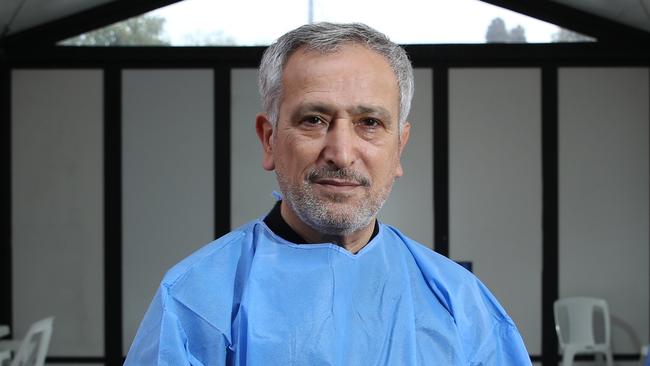Coronavirus: Arabic language barrier ‘must be broken down’
When a labourer told GP Jamal Rifi in Arabic that China had cooked up coronavirus in a secret lab, he was sad but not surprised.

When a 40-year-old labourer confidently told Sydney GP Jamal Rifi in Arabic that China’s government had cooked up the coronavirus in a secret lab, he was disappointed but not surprised.
Dr Rifi believes that people who speak English as a second language are being drawn to dangerous coronavirus conspiracy theories in their quest for reassurance during the pandemic.
“There is so much disinformation being propagated on social media, and when there’s a lack of health communication in Arabic, it is easy for conspiracy theories to find fertile ground,” he said.
“In the Middle East, many people are seeking to downplay the speed of contagion and how deadly the virus is, and for many Arabic-speaking Australians that is where they get their information from.”
Dr Rifi believes some linguistically diverse communities in Sydney are missing out on crucial health messaging, social-distancing instructions and updates on the COVID-19 health guidelines.
He is concerned Sydney could face a Melbourne-style lockdown because multilingual communities are not receiving official the coronavirus advice.
“There needs to be a strategic approach,” he said. “I have patients who come in and still want to shake my hand. They are being missed by health campaigns that are mainly in English.”
Last week, Victoria’s Chief Health Officer admitted the state government did not properly engage with linguistically diverse communities about COVID-19 in the lead-up to the city’s current resurgence in cases.
In a bid to avoid a similar spike among multicultural communities in Sydney, Dr Rifi is appearing regularly on the Arabic radio station Voice of Islam and running frequent Q&A webinars on COVID-19.
Vincent Ogu, chair of Africa Health Australia, is concerned that a link between linguistic diversity and infection rates could emerge in Sydney because of a failure by health officials to bridge language barriers.
As in Melbourne, Mr Ogu said many African-Australians in Sydney accessed information through community leaders, Facebook, WhatsApp or Viber groups — rather than the mainstream English news.
“People will often listen to media in their home countries where there is a lot of scepticism about whether the virus even exists,” he said.
More than 60 per cent of the NSW government’s coronavirus education campaign Find the Facts has been directed to audiences speaking languages other than English.
NSW Health said it had translated posters, factsheets, frequently asked questions and videos into more than 40 languages, including Mandarin, Cantonese, Korea, Arabic, Hindi and Greek.
However, to plug the language gap which Mr Ogu argues still persists, he spearheaded a public health campaign on WhatsApp and Youtube that targeted Arabic, Swahili, and Igbo speakers to “ram the message home”.
“No one was taking any notice of the government’s posters in their language because that’s just not enough to get the message through in a pandemic.”
“It was a race against time, but I believe it worked. Now, we are just trying to keep up the momentum and keep people informed in a way that the government isn’t doing.”
Some community leaders, however, are quick to point out that the outbreaks in NSW have occurred in areas that are overwhelmingly Anglo-Saxon.
“It’s not an issue confined to non-English speaking communities,” explained Bilal Rauf from the Australian National Imams Council.
“The clusters in Sydney have been on the eastern suburbs, in places like Bondi and Coogee,” he said. “There’s definitely a greater level of complacency in those pockets.”



To join the conversation, please log in. Don't have an account? Register
Join the conversation, you are commenting as Logout